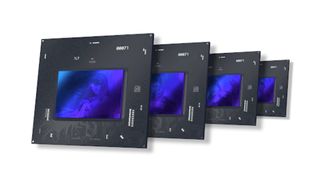Intel Arc flagship GPU is coming ‘very soon’ but won’t beat the Nvidia RTX 3060 Ti
Arc A770 and A750 desktop graphics cards should be here imminently

Intel will launch its pair of high-end Arc A7 graphics cards “very soon”, and Team Blue also let us know some home truths about these GPUs, including how performance will stack up compared to Nvidia.
All this comes from recent interviews conducted by PC Games Hardware (a German tech site) and Digital Foundry (Eurogamer), featuring Intel’s Tom Petersen and Ryan Shrout (as VideoCardz flagged up).
Intel shared a number of interesting things about what’s going on with Arc desktop GPUs, confirming that the next Alchemist graphics cards to arrive – the A770 and A750 high-end offerings, which will join the budget A380 that’s already out there – will be here “very soon”, so perhaps later this month.
There will be reference cards from Intel, available directly from Team Blue’s site, and custom boards from third-party card manufacturers will launch at the same time. The launch will incorporate “key” countries, one of which will be Germany (so this time, it won’t be Asia-only for a prolonged period).
When the flagship A770 does debut, it’ll be pitched at a rough performance level of midway between Nvidia’s RTX 3060 and 3060 Ti graphics cards, with the A750 being about equivalent to the RTX 3060.
Of course, as Petersen points out in the Digital Foundry interview, the kind of performance you’ll get will vary considerably between games depending on a whole host of factors (with one notable element being wonkier performance with DX11 titles, a much talked about point of late, compared to DX12 or Vulkan). But still, those are the rough performance guidelines to expect (on the AMD front, by the way, we’re talking about midway between the Radeon RX 6600 and RX 6650 XT for the A770).
Another topic touched on, performance-wise, is the heavy reliance of Intel’s Arc GPUs on ReBAR (Resizable BAR, a PCIe feature that allows the CPU to get full access to GPU memory for considerable frame rate boosts). There is an acknowledged problem for older PCs lacking support for ReBAR, and Intel is beavering away on driver optimizations to help those systems, which suffer from a pretty big performance loss with Arc GPUs due to missing out on that feature.
Get daily insight, inspiration and deals in your inbox
Get the hottest deals available in your inbox plus news, reviews, opinion, analysis and more from the TechRadar team.
Analysis: A refreshing attitude from Intel that gives us some hope
What’s refreshing in these nuggets imparted by Intel is the honesty of Petersen. For example, we just mentioned that thorny ReBAR support issue, and while Intel is indeed working on optimizing for older PCs in that regard, for now, Petersen advises those users to simply go with Intel’s GPU rivals, AMD or Nvidia. That kind of open and frank comment is a theme of the interviews here, which is good to see.
Petersen freely admits that regarding the delay of the desktop Arc GPU rollout, while there were supply issues that held things up, the problems mostly revolved around ensuring game compatibility and a good experience for buyers in terms of that. And yes, with thousands of popular existing games out there, this was always going to be a headache.
Intel must have known that, of course, but reading between the lines, maybe it turned out to be considerably more of a headache than anticipated, hence the prolonged delays.
What’s also made clear here is that the performance levels of the Arc graphics cards won’t be in line for a major boost from further tuning of graphics drivers, but what we can expect is much better compatibility over a swathe of games, and a better overall experience – that’s mostly what Intel is continuing to try to nail down right now.
So the upshot is that Intel won’t be upping the ante for performance, and with next-gen GPUs on the horizon for AMD and Nvidia, the heat of the competition in the graphics card arena is about to get turned up – seriously. The suggestion is that where Intel can compete is on price, and that’s what we’re hoping for – some A7 series desktop GPUs which are keenly priced to tackle rival products.
Petersen also underlines that Intel isn’t just in this for a year, or a few years, or even a decade – it wants to be a player in the graphics card space for a long, long time, and as the months roll on, we can expect those drivers to get more and more honed, and in better overall shape.
While the Arc Alchemist launch has been pretty disappointing thus far, what isn’t disappointing is Intel’s attitude here, and that does give us some hope for a brighter, more competitive GPU world where three players are fighting it out, rather than a duopoly.
Darren is a freelancer writing news and features for TechRadar (and occasionally T3) across a broad range of computing topics including CPUs, GPUs, various other hardware, VPNs, antivirus and more. He has written about tech for the best part of three decades, and writes books in his spare time (his debut novel - 'I Know What You Did Last Supper' - was published by Hachette UK in 2013).
Most Popular

